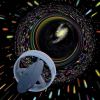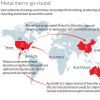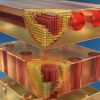Viewing cesarb's Snapzine
-
1.

The physics of Doctor Who's awesome time-traveling ship are real and they're fascinating
The time-traveling box in "Doctor Who," called the TARDIS, is easily the coolest part of the show. It's capable of traveling any direction through space and time — so it can visit any planet at any point in history.
Posted in: by mtnrg -
2.

Map: The remarkable distances you can travel on a European train in less than a day
Tourists visiting Europe are often advised to travel by train rather than plane or car. Trains are considered reliable, fast and relatively cheap. But as a new research project shows, there are major differences within Europe: Whereas you can travel from London to Paris in less than four hours, traveling the same distance can last more than 22 hours in eastern Europe.
-
3.

How to Make Your WordPress Site Blazing Fast
Today’s web users have the need for speed. With internet and cellular connections getting faster and faster, users expect sites to feel snappy. As developers, we must make sure we’re doing our best to serve those pages quickly. This article will focus on what you should be doing to make sure your WordPress sites are as fast as possible.
Posted in: by bkmacdaddy -
4.

NASA: No, We're Not on the Verge of Developing a Warp Drive
Despite the fevered reports rocketing around the Internet, NASA is not close to developing a fuel-free, faster-than-light propulsion system.
Posted in: by drunkenninja -
5.

The Octopus Uses Its Skin To Detect Light
May 23, 2015 By Jakob Nielsen Leave a Comment
Posted in: by Gozzin -
6.

Why Do Expensive Hotels Charge for Wifi?
It's an economic mystery: The cheapest backpackers' hostel has free wifi. Brands like the Ritz-Carlton do not. Why is that?
-
7.

Hawking radiation mimicked in the lab
Sound waves used to imitate light particles predicted to escape black holes.
Posted in: by drunkenninja -
8.

Jumbled arrangement of atoms allows bulk metallic glasses to flow like honey
These laboratory-made metals have unusual properties that consumer electronics manufacturers love. New research used high-energy X-rays to figure out why.
Posted in: by Cobbydaler -
9.

Publishing: The peer-review scam
When a handful of authors were caught reviewing their own papers, it exposed weaknesses in modern publishing systems. Editors are trying to plug the holes. Most journal editors know how much effort it takes to persuade busy researchers to review a paper. That is why the editor of The Journal of Enzyme Inhibition and Medicinal Chemistry was puzzled by the reviews for manuscripts by one author — Hyung-In Moon, a medicinal-plant researcher then at Dongguk University in Gyeongju, South Korea.
Posted in: by drunkenninja -
10.

Editor quits journal over pay-for-expedited peer-review offer
Authors can pay open-access journal extra to get reviewed in less than 3 weeks
Posted in: by AdelleChattre -
11.

Cheap wonder metals will make a faster, cleaner world
If only aluminium, titanium and magnesium were cheaper, they would replace steel and help us cut fuel bills and emissions. That day may not be far off.
Posted in: by Cobbydaler -
12.

New 'high-entropy' alloy is as light as aluminum, as strong as titanium alloys
Researchers from North Carolina State University and Qatar University have developed a new "high-entropy" metal alloy that has a higher strength-to-weight ratio than any other existing metal material. High-entropy alloys are materials that consist of five or more metals in approximately equal amounts. These alloys are currently the focus of significant attention in materials science and engineering because they can have desirable properties.
Posted in: by TNY -
13.

Nanostructures Offer Medical Images Without X-Rays
Researchers at the University of California, Santa Barbara (UCSB) have developed a recipe for creating a nearly perfect compound semiconductor that could lead to more efficient photovoltaics, safe and high-resolution biological imaging and the ability to transmit massive amounts of data at higher speeds.
Posted in: by larylin -
14.

Major publisher retracts 43 scientific papers amid wider fake peer-review scandal
An investigation by "BiomMed Central" has revealed a scheme to "deceive" journal editors by suggesting fake reviewers for submitted articles. The spectrum of ‘fakery’ has ranged from authors suggesting their friends who agree in advance to provide a positive review, to elaborate peer review circles where a group of authors agree to peer review each others’ manuscripts, to impersonating real people, and to generating completely fictitious characters.
-
15.

Scholarly journal retracts 60 articles, smashes ‘peer review ring’
Every now and then a scholarly journal retracts an article because of errors or outright fraud. In academic circles, and sometimes beyond, each retraction is a big deal. Now comes word of a journal retracting 60 articles at once. The reason for the mass retraction is mind-blowing: A “peer review and citation ring” was apparently rigging the review process to get articles published.
Posted in: by spacepopper -
16.

How the Biggest Fabricator in Science Got Caught
Yoshitaka Fujii falsified 183 papers before statistics exposed him. In April of 2000, the journal Anesthesia & Analgesia published a letter to its editor from Peter Kranke and two colleagues that was fairly dripping with sarcasm. The trio of academic anesthesiologists took aim at an article published by a Japanese colleague named Yoshitaka Fujii, whose data on a drug to prevent nausea and vomiting after surgery were, they wrote, “incredibly nice.”
Posted in: by drunkenninja -
17.

How to boost or increase your WIFI speed and signal
This video shows you how to make a WiFi signal and speed booster. Easy to make in just 6 minutes.
-
18.

Genetic Secrets of Brazil’s Rarest Tree Revealed
A critically endangered tree is suffering from a genetic bottleneck, but it hasn’t given up the fight
Posted in: by AdelleChattre -
19.

Sheldrake-Shermer, Materialism in Science, Opening Statements
Through the months of May, June, and July of 2015, TheBestSchools.org is hosting an intensive dialogue on the nature of science between Rupert Sheldrake and Michael Shermer. This first month, the focus is on materialism in science.
Posted in: by AdelleChattre -
20.

NASA's WISE Spacecraft Discovers Most Luminous Galaxy in Universe
A remote galaxy shining with the light of more than 300 trillion suns has been discovered using data from NASA's Wide-field Infrared Survey Explorer (WISE).
Posted in: by NikonGirl -
21.

The End of Mass Media as We Know it
We’re in the year 2049. The world has seen an apocalyptic breakdown of all media known to man. There is no more human communication outside the global network of Facebook. A protocol of the end of mass media as we know it. Holo, tell me about how it used to be in the Old World! What do you want to know? How did people access Facebook in the old days, when they didn’t have holo lenses? There was no such thing as Facebook.
Posted in: by wildcard -
22.

How the eyes betray your thoughts
Look closer at eye movements and you can find out what’s happening inside somebody’s head, says Mo Costandi.
Posted in: by AdelleChattre




















